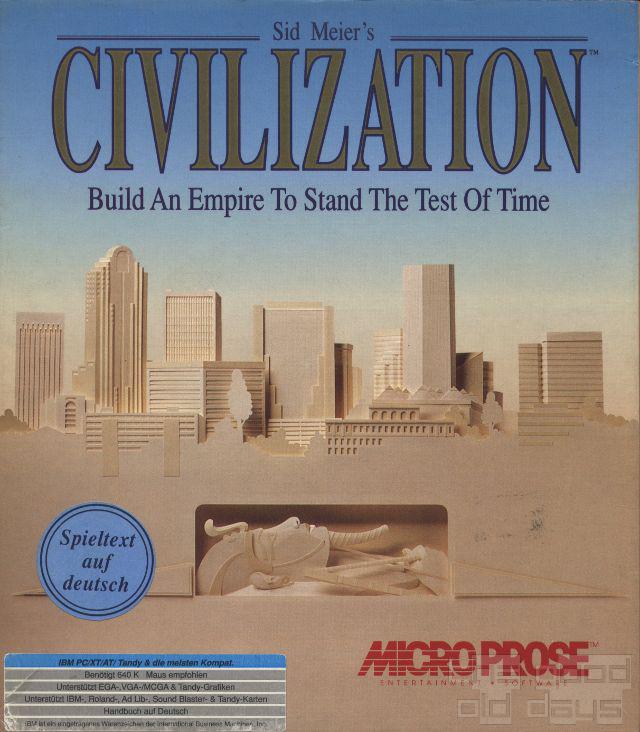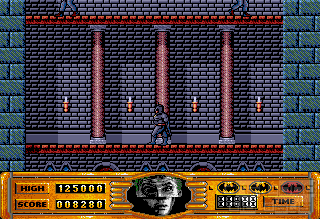Without any doubt, Civilization is the greatest and most addictive game that ever graced a computer screen. Designed by Sid Meier, who at that time was already a household name among gamers, the game introduced the world to a new level of empire management: from settling whole continents, through researching new technologies, to building military units, city improvements and even wonders of the world. The game has spawned several sequels and copies, out of which only a single one (Alpha Centauri) comes close in the terms of gameplay and overall fun. Civilization has never left my hard drive, and probably never will, remaining the main reason why I still keep MS-DOS on a separate partition.
In Civilization, you play as a leader of a nation. At the beginning, after selecting the interface and world properties, you will be able to choose from one of fourteen nations to lead. There is not much difference between the nations, but the computer always selects the same opponents, so after a little practice you will figure out which nations it is easier to play the game with. After selecting one of the five difficulty levels, you will be dropped with a single settler somewhere in the world, and from then on it's up to you.
Your first task is to establish a city. Each city will take advantage of the eight surrounding squares, and thus the placement is very important. Some terrains, such as mountains or deserts, offer very little in terms of food and production; others, such as grasslands are great for growing crops. Rivers add trade bonuses, as do roads, which you will be able to build later. For now, it is important to have a steady supply of food to see your population increase and a good supply of production (represented by shields for some reason), which will allow you to build city improvements and military units. Later in the game, you will need those production shields to support your units as well.
When you establish your first city, you will be prompted to select a technology to research. The rate at which you research will depend on your income and what a share of it you spend on research. As you discover new technologies, you will be able to build new city improvements and units. The city improvements can be divided into six categories: defense (barracks, city walls), city growth (granary, aquaduct), research (library, university), production (factory, power plant), happiness (temple, cathedral) and trade (marketplace, bank). Each improvement costs a certain amount of money to maintain, so you will need to keep a balanced budget. You will also be able to build unique structures, wonders of the world, which will give you certain advantages.
To make matters even more complicated, your people will be unhappy with some of your decisions, and you will have to keep them at least content. This is being achieved by some of the structures, or spend part of your income on luxuries. As you can see, your tax income will be divided into three categories: income, research and luxuries, and you will have to carefully balance all three.
Over time, you will establish other cities and improve the land around them. Special units will be able to irrigate some terrain squares, build mines on others ands build roads (and later railroads) almost everywhere. Other units, caravans, will be able to increase your income by establishing trade routes between different cities. Then there are the military units, ranging from militia to nuclear missiles. If you feel that playing a cloak-and-dagger game is more your style, you will have diplomats available, who are able to bribe enemy units, destroy city improvements and do other nasty tricks to your opponents.
All those units will become very important: sooner or later, you will run into other nations, with the same goal that you have: destroy all opponents or be the first to build a spaceship and colonize Alpha Centauri. From the first meeting on, you will be able to build diplomatic ties, declare war on each other, demand tribute, exchange technologies and more. The designers' ingenuity went as far as to allow you to learn much about the other civilization on your meetings: the number of people on the screen indicating the size of the civilization, and their appearance indicating the form of government. That's right, you will be able to change your government as well. All forms of government have certain advantages and disadvantages, and depending on the stage of the game (and your technology) you will be able to choose which government to use.
All this sounds like a very complicated game, but thanks to the detailed manual (which set a new, unsurpassed standard for manuals) and the relatively slow introduction of more advanced game principles, learning the game is very easy. Mastering it is the hard part?
While the concept of the game is absolutely perfect, the technological aspect is a little weaker. I can say nothing bad about the interface. In current standards, the interface is rather bad, but in 1991, it was very simple, allowing the player to use a drop-down menu when he didn't remember a certain shortcut. The graphics, too, are simple, but very well visible, allowing absolutely no confusion. In fact, I like them more than the flat and lifeless graphics in Civilization II. However, the game absolutely fails in the area of artificial intelligence. Not only the opponents are dumb and predictable, but higher difficulty levels simply make the game harder for you and not increase the intelligence of the opponents. The stupidity of computer-controlled nations is most apparent in diplomacy: they have no memory, allowing you to sneak-attack them and sign peace over and over again.
Still, despite these shortcomings, Civilization is the one game every self-respecting gamer should play. Even after all those years and several sequels, it remains highly playable, mainly because of the delicate balance that was achieved here, and never repeated again. The game is much more simplistic than its sequels, and it is this simplicity that makes it so easy to learn and so hard to master, and that allowed the designers to tightly control the balance throughout the entire game. The game has justifiably been named the best computer game of all time by many magazines, and fortunately is still sold. SO what are you waiting for? Go and get it now.


Comments (9) [Post comment]
Spend more just than hours on this game - a masterpiece back in time. Looking at the graphics these days I think, "hui, wow, how could I played it". But it worked greatly. Didn't Sid Meier said once "my graphics are functional!"?
I love(d) it.
Indeed, once you reach conscription and armors, there is nothing to stop you anymore usually. The computer opponents are really only dangerous in the early game. Typical problem with AIs
Another related thing which occured to me is at least in my "default" style of playing, how it's basically useless to spend money on military before that industrial age. Just few defending units here and there, but attacking armies become outdated so rapidly that waging war is really not worth it (unless you go for the common full-out chariot war machine strategy which obviously always succeeds).
Just finished my most recent world conquest today and funnily this game somewhat still holds up. Maybe because the gameplay's complexity just hits the sweet spot between being easy to pick up (again) and offering enough challenge to keep up your interest.
Though I have to say: The most interesting part is the beginning and things lose a lot of steam as soon as you hit the industrial revolution. Probably because for one things get repetitive and for two by then you have practically won the game and you are just going through the motions until you eventually win.
Funny thing about this particular playthrough: I had a cavalry unit right from the start (from one of those random events), and I rushed all through Europe, Asia and Africa until I had beaten all the civs there. The rest of the game was just a piece of cake.